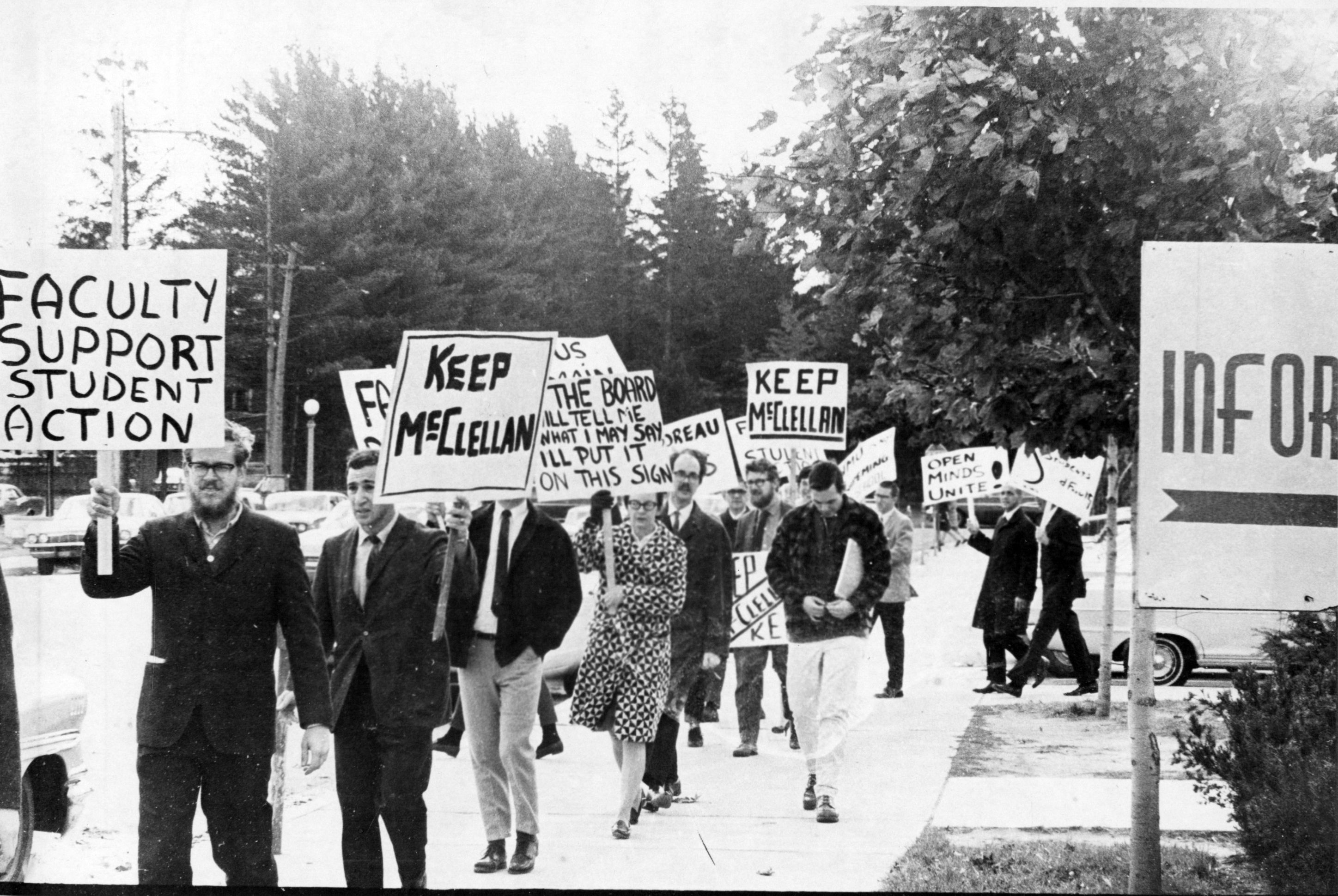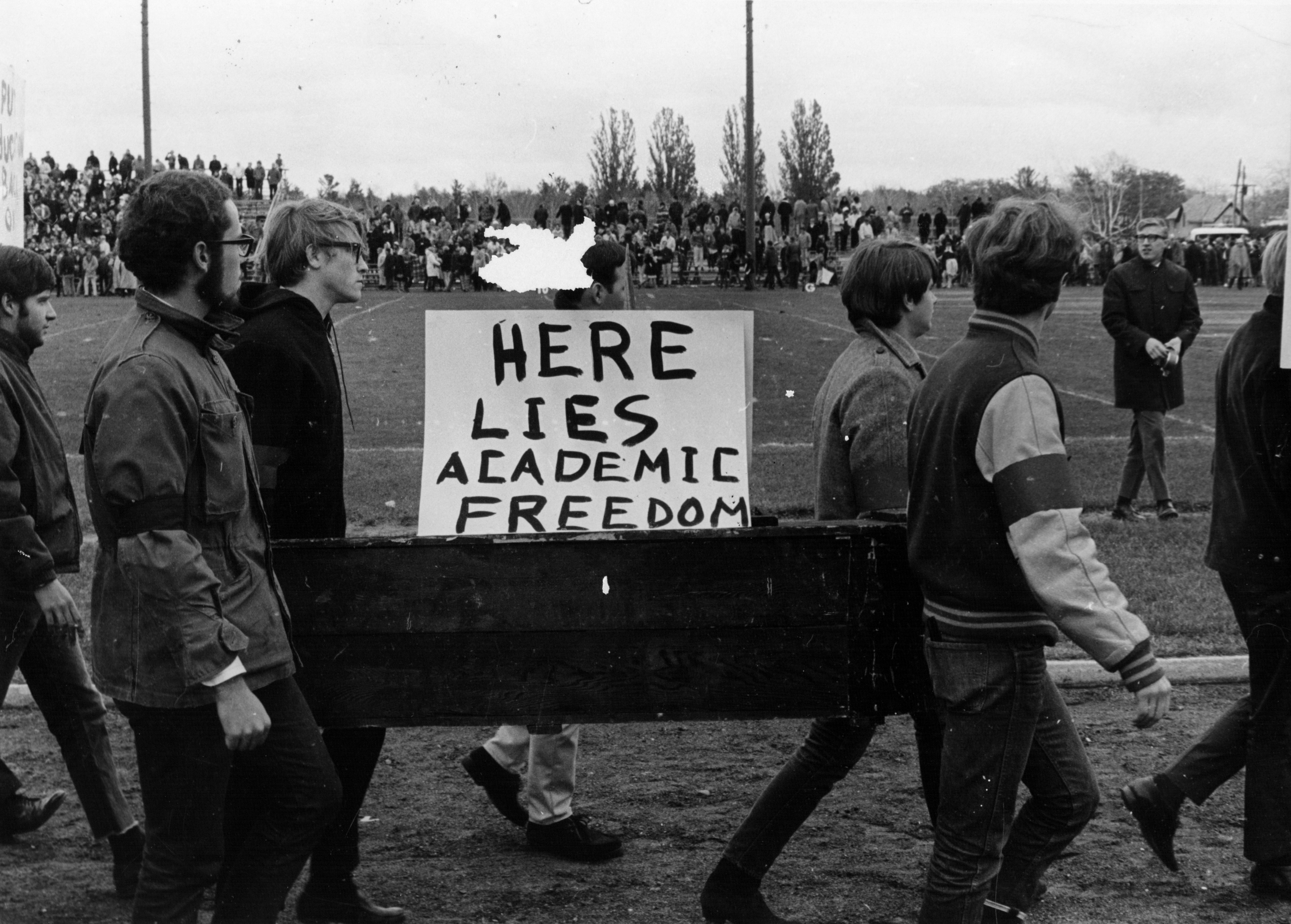The McClellan Controversy (Continued)
End of the Year Meeting
The NMU Archives has a tape of a student meeting which dates from sometime after the controversy over the inserting of McClellan information into the Parents’ Day letters. It could be the “symposium” entitled “What Ever Happened to Dr. McClellan?” mentioned in one article from late May 1968. Those speaking at the meeting gave an overview of the actions taken over the year. They noted that “Even the student government [admitted] that [the letter stuffing] was underhanded.” They emphasized that students and faculty were trying to understand “an un-understandable group of people” and were exhausting all possible means before going to court. One speaker asserted that the Board of Control was afraid of the truth and of student power. In response to one of the original charges that keeping McClellan was not in the best interests of the university, one speaker said that Dr. Harden “was not in the best interest of the university.”
Most notably, McClellan himself spoke at the meeting. He said that the question wasn’t about whether or not he should be hired or fired, but “whether we’re going to tolerate a university where people get fired for having ideas” and that the community needed “opportunities to work out the wrongness and rightness of things as we view them.” Everyone was using the phrase “in the best interest of the university” but was coming to radically different conclusions. The problem was that no one agreed what a university ought to be, and that the “men of good intentions” on all sides needed to communicate about their conceptions of what a university should be. He told the students:
If you accept injustice, then you become unjust. And if you will not permit the exchange of ideas, then you become restricted in your own actions. There’s no two ways about it…The question is not whether you win. That isn’t the question. The question is what happens to you inside, what kind of a person are you. Are you a student or are you a trainee? That’s the question. I don’t know whether we’ll win or not. We’ll try as best we can. But this is what those of us who believe in ideas have got to do in order to preserve our self-respect. There’s no other alternative.
The school year ended with no definite resolution, but by the next fall, McClellan had been reinstated. Students questioned what had happened in the interim—did the administration think that it was going to lose the case? The Editor of the newspaper noted that speculators agreed that “the testimony wasn’t painting a very rosy picture for the administration’s case, or at least was indicating that the fight would be long and bitter, that individuals who had no desire to be dragged any deeper into the mire would have to be, and, in short, it created a serious question of whether or not it would be worth it in the end, even if a legal victory resulted for the administration.” Some information about the settlement is clearer now than in July 1968.
Jamrich Re-instates McClellan
In mid-March, John X. Jamrich had been announced as the next President of the university. The students had contemplated sending him a letter asking his position on the McClellan issue, but worried that he might not have studied the issue fully yet and did not want to “convey an air of hostility.” By April, Jamrich had met with faculty members about the McClellan issue and had been in touch with a national-level AAUP official, Jordan Kurland, about issues of “academic governance” such as the McClellan case. In May, he met with national AAUP officials about the case, but his personal stance on the case was still not clear.
In late May, McClellan’s lawyers tried to get an injunction that would require McClellan’s job and pay to be continued until the actual court case occurred, but the judge refused. Both sides also filed court case briefs in early June. The judge set the trial to begin in August. In the interim, however, they settled out of court. In an interview, McClellan described what happened:
When I settled with Jamrich, it was at a place downstate. And John McGoff was there and Jamrich was there and a couple of other members of the Board of Control. I remember walking outside and John McGoff had hurt his foot and he was kind of limping along…and a train came by. And John McGoff was going on about how he liked trains and then Jamrich came out and the three of us stood there and “we could work something out” said Jamrich…my case was in federal court at that point. So I was quote, given my job back, end quote. I wasn’t given tenure and my raise for that year I believe was $200.
On July 2, McClellan’s reinstatement was announced in the Northern News. As students discovered that the McClellan controversy had come to a close, there was a sense that the student body, administration, and faculty had finally learned to work together, just as many had felt after the protests supporting Harden. The Editor of the Northern News wrote a dramatic article in July of 1968 entitled “America is Change, NMU is America” which exemplified this sense of optimism in the future.
"Various frustrated individuals at the time found themselves predicting the end for the University. The University was supposed to be sick beyond possible cure. According to these people the only way to save it was to tear it down to the last brick and start all over. It is very interesting that you can save by destroying it, but none the less this was the contention… Northern Michigan University has not been destroyed. It is not dead. It has in fact gained from that hectic and heated controversy a new breath of life.
As the University’s vigorous new President, John X. Jamrich, assumes the responsibility of leadership with the announced intention of meeting this nationwide problem of academic governance, it appears that the University could be on the threshold of a great tomorrow that will have the administration, faculty, and student body working together toward fine achievements…
Yes, America is change and Northern Michigan University is America. To the weak, the short-sighted, this conflict that can arise out of change spells nothing more than the bitter end, but to the bold and strong, this is where is found the possibility of a greater tomorrow."


